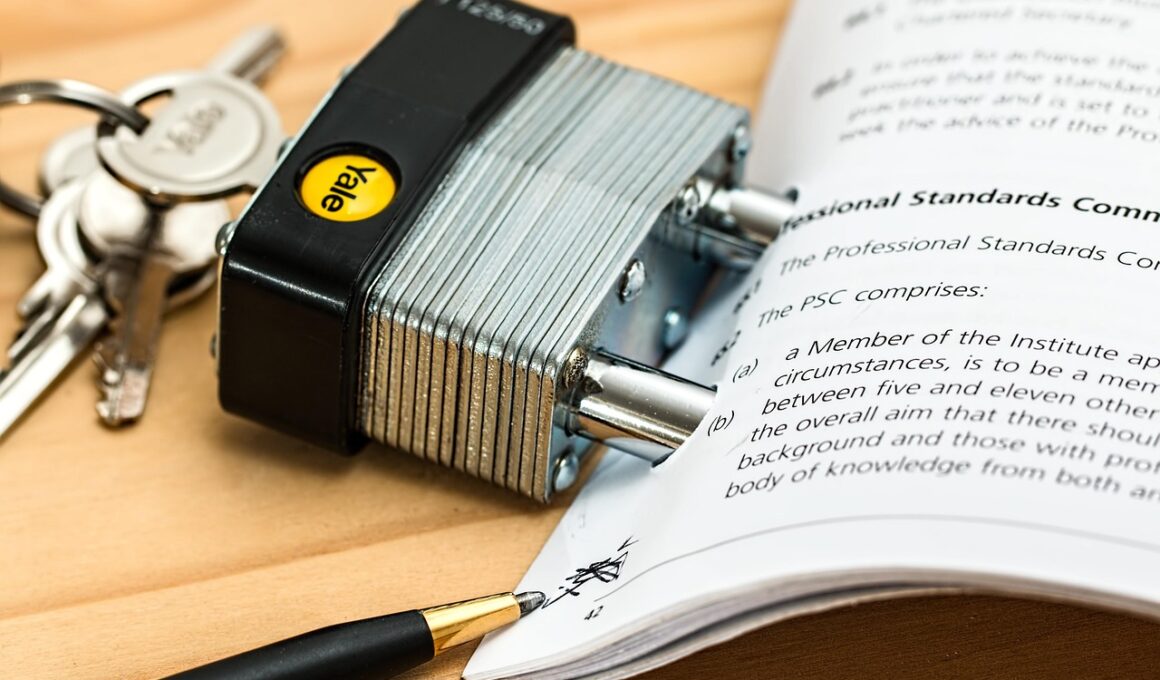How to Safeguard Your Retirement Assets with Trusts
Retirement planning involves careful consideration of your assets, including how to protect them from unforeseen circumstances. One effective way to secure your retirement assets is to consider establishing trusts. Trusts offer several benefits, including protecting your wealth from creditors. This can be crucial, especially in cases of financial hardships experienced after retirement. In addition to avoiding creditors, trusts help you manage the distribution of your assets upon your death, ensuring that heirs receive what you intended. There are multiple types of trusts available, such as revocable and irrevocable trusts, each with unique advantages and drawbacks. Understanding these differences will allow you to choose the one that best fits your retirement goals. For instance, revocable trusts allow you to change terms anytime, while irrevocable trusts can shield assets from estate taxes. You can seek professional guidance to help you make informed decisions regarding asset protection through trusts. In this process, it’s essential to evaluate your total assets and future needs while also aligning your trust strategy with your overall retirement plan.
After establishing a trust, it’s crucial to fund it properly. Funding a trust means transferring your assets into it, which can include real estate, bank accounts, investments, and other valuables. If you don’t fund the trust correctly, your wishes may not be upheld, and those assets could potentially go through probate. This process can be lengthy and costly, negating some advantages of setting up the trust initially. To ensure your assets are placed in the trust, consider creating a comprehensive list of items that need to be transferred and schedule a meeting with your attorney to handle the logistics. Consult with your legal or financial advisor to accurately complete the funding, as they can offer insights specific to your situation. Furthermore, reviewing and updating your trust documents regularly will ensure alignment with changing financial goals or family dynamics. Life events like marriage, divorce, or the birth of a child can significantly affect your estate planning. By doing this, you not only safeguard your retirement assets but also provide peace of mind for your beneficiaries, knowing they are cared for under your plan.
The Role of Successor Trustees
Choosing a successor trustee is another fundamental decision in your estate planning. The successor trustee will manage and distribute your assets according to your wishes after your passing. It’s essential to select someone you trust and who possesses the skills to handle financial responsibilities. Evaluating the potential candidate’s experience in managing finances and their understanding of taxes can be beneficial. Family members, friends, or professional fiduciaries can serve in this role. If you decide to choose a family member, consider their availability and willingness to take on these important obligations. However, naming a professional fiduciary may provide more neutrality and expertise in managing your assets effectively. Before selecting anyone, have an open conversation about the responsibilities and expectations involved with being a trustee. This transparency can help ensure your wishes are followed, preventing disputes that may arise after your passing. Ultimately, the individual or entity you choose as your successor trustee should reflect your values and understanding of how you want your retirement assets distributed to your loved ones after your lifetime.
Additionally, should you consider using a living trust rather than a will for estate distribution? Living trusts have numerous advantages over traditional wills. Firstly, assets in a living trust typically avoid probate, expediting the transfer to heirs without unnecessary delays. This can be especially advantageous for your retirement assets when liquidity is needed for living expenses. Furthermore, living trusts keep matters private; unlike wills, they do not become a matter of public record. This can protect your family from unwanted scrutiny during difficult times. Moreover, a living trust allows for the ongoing management of your assets should you become incapacitated. By entrusting a successor trustee during such situations, you help ensure that your financial responsibilities are honored, safeguarding your retirement lifestyle. They can manage bills, real estate, and other assets according to your wishes. Thus, understanding the importance of living trusts can provide greater confidence in securing your future and preserving your retirement funds. Consulting with an experienced estate planning attorney can offer valuable insights specific to your circumstances and ensure your living trust aligns with your retirement goals.
Understanding Tax Implications
Tax implications significantly come into play when planning for retirement and establishing trusts. While trusts offer advantages in asset protection, certain tax consequences may arise, which should not be overlooked. For instance, income generated by assets held within an irrevocable trust may be taxed as part of the trust, potentially leading to higher tax liabilities. Understanding these tax dynamics is essential for optimizing your financial strategy. Consult a tax professional or estate planning attorney who can help you navigate these complexities effectively. They can provide personalized advice tailored to your financial landscape, helping you avoid pitfalls and ensure compliance. Additionally, by staying informed about changing tax laws, you can take advantage of new regulations favoring certain trust strategies. Be proactive in reviewing your financial situation; doing so can help you reposition assets and maximize benefits. Developing a comprehensive tax strategy that aligns with your retirement planning will safeguard your wealth while optimizing distributions for your beneficiaries. A well-informed plan helps mitigate unforeseen tax liabilities and keeps your retirement assets intact for future generations.
Moreover, communication with your beneficiaries about how your estate will be handled is a key element of effective estate planning. Engaging family members or heirs in discussions about your trusts can clarify any misunderstandings that may occur after your passing. This proactive approach cultivates a sense of inclusivity and ensures everyone is aware of your intentions. Holding family meetings can be a good platform to discuss your wishes openly. Utilize these gatherings to explain the logic behind your decisions, as transparency can help eliminate disputes. It might also help loved ones feel empowered and understand their roles in managing the trust. Regular updates about changes in your estate plan can also keep everyone informed. Make sure to address any questions or concerns your heirs may have. This can significantly alleviate family tensions that might arise due to misinterpretation of your wishes. By taking these actions, you ensure that the future distribution of your retirement assets is a source of security rather than division among beneficiaries, ensuring their financial well-being.
The Importance of Regular Reviews
Lastly, regularly reviewing your estate plan, including trusts, is crucial to ensure it aligns with your current financial situation and goals. Life changes, such as marriages, divorces, job changes, or births, can significantly impact your retirement assets and distribution plans. Each significant event should prompt a review of your estate plan to ensure it accurately reflects your wishes. Make it a habit to revisit your trusts and related documents every few years, or following major life changes. Regular evaluations allow you to catch any potential issues early and adjust your strategies accordingly. Additionally, keeping an ongoing dialogue with your financial advisor or estate planning attorney will keep your plan updated and relevant. They can introduce you to new options or strategies that may benefit your financial situation significantly. Ultimately, continuous assessment of your estate plan helps safeguard your retirement assets from unforeseen changes and ensures that your wishes are fulfilled successfully, providing a lasting legacy for your family. Investing time in regular reviews can lead to secure retirement and peace of mind for you and your loved ones.
In conclusion, safeguarding your retirement assets through proper estate planning and trust establishment significantly strengthens your financial future. Trusts provide valuable tools for asset protection, ensuring that your intentions are honored while you are alive and after your passing. Through informed discussions and collaboration with trusted advisors, you can navigate the complex landscape of estate planning, tailoring your strategy to your personal goals. With various trusts available, understanding their unique attributes enables you to protect against creditors and ensure a smooth succession process for beneficiaries. By choosing a responsible successor trustee and communicating clear expectations, you minimize potential disputes among family members during difficult times. Moreover, being aware of tax implications allows you to optimize distributions and preserve wealth for future generations. Regular reviews ensure that your estate plan remains adaptable to your changing circumstances. Ultimately, all these elements work harmoniously together to create a secure and stable financial future. Make it a priority to stay informed, adjust strategies, and prioritize your retirement goals. Doing so ensures that you, along with your loved ones, can enjoy the peace of mind that comes with proper planning and asset protection.





